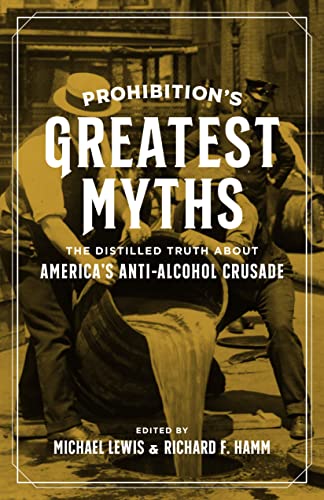
Inhaltsangabe
The word ""prohibition"" tends to conjure up images of smoky basement speakeasies, dancing flappers, and hardened gangsters bootlegging whiskey. Such stereotypes, a prominent historian recently noted in the Washington Post, confirm that Americans' ""common understanding of the prohibition era is based more on folklore than fact."" Popular culture has given us a very strong, and very wrong, picture of what the period was like. Prohibition's Greatest Myths: The Distilled Truth about America's Anti-ÂAlcohol Crusade aims to correct common misperceptions with ten essays by scholars who have spent their careers studying different aspects of the era. Each contributor unravels one myth, revealing the historical evidence that supports, complicates, or refutes our longÂ-held beliefs about the Eighteenth Amendment.
H. Paul Thompson Jr., Joe L. Coker, Lisa M. F. Andersen, and Ann Marie E. Szymanski examine the political and religious factors in early twentiethÂ-century America that led to the push for prohibition, including the temperance movement, the influences of religious conservatism and liberalism, the legislation of individual behavior, and the lingering effects of World War I. From there, several contributors analyze how the laws of prohibition were enforced. Michael Lewis discredits the idea that alcohol consumption increased during the era, while Richard F. Hamm clarifies the connections between prohibition and organized crime, and Thomas R. Pegram demonstrates that issues other than the failure of prohibition contributed to the amendment's repeal. Finally, contributors turn to prohibition's legacy. Mark Lawrence Schrad, Garrett Peck, and Bob L. Beach discuss the reach of prohibition beyond the United States, the influence of antiÂ-alcohol legislation on Americans' longÂterm drinking habits, and efforts to link prohibition with today's debates over the legalization of marijuana.
Together, these essays debunk many of the myths surrounding ""the Noble Experiment,"" not only providing a more inÂ-depth analysis of prohibition but also allowing readers to engage more meaningfully in contemporary debates about alcohol and drug policy.
Die Inhaltsangabe kann sich auf eine andere Ausgabe dieses Titels beziehen.
Über die Autorin bzw. den Autor
Michael Lewis is professor of sociology at Christopher Newport University in Virginia and author of The Coming of Southern Prohibition: The Dispensary System and the Battle over Liquor in South Carolina, 1907- 1915.
Richard F. Hamm is professor of history at the University at Albany, State University of New York, and author of Murder, Honor, and Law: Four Virginia Homicides from Reconstruction to the Great Depression.
„Über diesen Titel“ kann sich auf eine andere Ausgabe dieses Titels beziehen.
Suchergebnisse für Prohibition's Greatest Myths: The Distilled Truth...
Prohibition`s Greatest Myths The Distilled Truth about America`s AntiAlcohol Crusade
Anbieter: Revaluation Books, Exeter, Vereinigtes Königreich
Hardcover. Zustand: Brand New. 176 pages. 8.50x5.50x0.50 inches. In Stock. Artikel-Nr. x-0807170380
Neu kaufen
Anzahl: 2 verfügbar
Prohibition\ s Greatest Myths: The Distilled Truth about America\ s Anti-Alcohol Crusade
Anbieter: moluna, Greven, Deutschland
Zustand: New. Popular culture has given us a very strong, and very wrong, picture of what the prohibition period was like. Prohibition s Greatest Myths aims to correct common misperceptions with ten essays by scholars who have spent their careers studying different aspec. Artikel-Nr. 328041367
Neu kaufen
Anzahl: Mehr als 20 verfügbar
Prohibition's Greatest Myths : The Distilled Truth about America's Anti-Alcohol Crusade
Anbieter: AHA-BUCH GmbH, Einbeck, Deutschland
Buch. Zustand: Neu. Neuware - 'As a prominent historian recently noted in the Washington Post, 'The common understanding of the Prohibition Era is based more on folklore than fact.' This volume aims to correct common misconceptions about American prohibition in ten essays from scholars who have spent their careers studying different aspects of the era. Each contributor unravels one myth and reveals the historical evidence that supports, refutes, or complicates a deeply embedded misunderstanding. Paul Thompson takes on the myth that temperance and prohibition were the same and that the movements shared the same goals and tactics. Joe Coker shows that it was religious liberals, not conservatives, who spearheaded the prohibition movement. Lisa Andersen slays the persistent idea that prohibitionists were trying to legislate individual behavior, and Ann-Marie Szymanski shows that World War I was the primary cause for the enactment of national prohibition. Michael Lewis debunks the idea that alcohol consumption increased during the era. Richard Hamm shows that prohibition did not start organized crime. Thomas Pegram shows that the failure of prohibition alone did not lead to its repeal, while Mark Schrad shows that prohibition was not uniquely American but a worldwide phenomenon. Garret Peck reveals that prohibition had a long-term effect on American drinking habits, and Robert Beach discredits the idea that the current debates over marijuana legalization are the same as those Americans had during the 1930s that ended prohibition. Together the essays unravel embedded myths and provide a much more nuanced understanding of the prohibition era. Such an understanding will allow readers to engage more meaningfully in contemporary alcohol and drug policy debates'. Artikel-Nr. 9780807170380
Neu kaufen
Anzahl: 2 verfügbar
